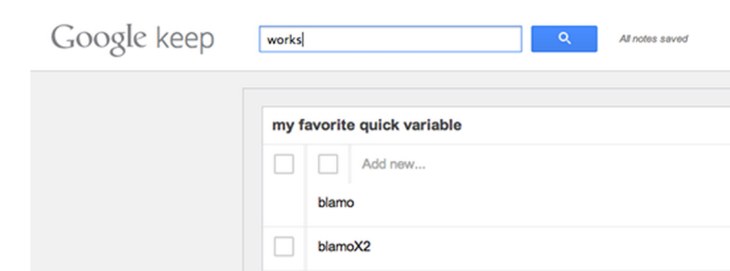Google is experimenting with an Evernote-like service called “Keep,” which accidentally made a brief appearance today before disappearing again. If such a launch is indeed on the horizon, then the timing is downright bizarre. Google has not yet recovered from squandering its goodwill with the shutdown of Reader, whose demise has been covered not only by blogs, but also more mainstream publications like The Economist and The Financial Times. And Google is now becoming known for regular “spring cleanings,” which have led to the termination of services, programs and utilities that never caught on with large numbers of users.
And yet, Google thinks users will now trust our notes to its cloud, after previous shutdowns of similar services like Google Notebook or Google Bookmarks Lists?
Excuse me, but I just snorted coffee out of my nose while laughing.
Look, it’s all well and good that Google has decided to operate like a business that cares about bottom lines and profits, as opposed to caring about niche portions of its enormous user base who have become attached to similarly niche services, like Reader, Notebook, iGoogle and so on.
But while it’s one thing to have to give up goofy experimental features like Gmail Goggles, which prevented you from sending out drunken emails by forcing you to first do some math equations, it’s quite another to launch services that people are meant to adopt and use for actual work-related purposes, and then expect users to trust that those new services will remain functional in the future.
Because – message received – that’s clearly no longer the case.
What will happen if, one day, Google realizes that its Google Drive users aren’t adopting Keep in significant numbers? Or that it would be so much cooler if your notebooks became a feature on Google+ instead? Based on previous company behavior, it seems that Google will throw your data in Takeout, announce the closure via blog post, and inform you that you’ll need to migrate to an alternative service. You know, like Evernote. (Incidentally, the very service that used Google’s shutdown of Notebook back in the day for marketing purposes. Welcome, Google refugees!)
Keep is on shaky ground, even before launching.
Clouds Made Of Air
The “cloud,” so to speak, has enough challenges today as it is without the threat of continuous closures. It’s still a relatively new concept – especially for the mainstream users Google is after – that the Internet can be used to deliver products and services in ways that surpass desktop software in performance, security, functionality and feature set. That the cloud isn’t just “as good as” a desktop program, it’s better.
I mean, really, I literally, just last night helped migrate a family member’s calendar from Outlook to Google Calendar on his new Android tablet, which he uses primarily for email, documents, games and Bible study.
It’s easy to forget in our little tech bubble, that for some, the times are just now a changin’.
That the cloud is better is still a somewhat difficult argument to make. The cloud goes down. Then you can’t work, such as is the case with the Google Drive or Gmail outages, for example. Never mind that the cloud doesn’t go down any more or less, generally speaking, than other, on-premise IT solutions once did (like SharePoint or Exchange, for example). It’s that users today have to overcome that feeling of helplessness when the cloud “disappears.” When the login page takes you to an error message, it doesn’t matter that cloud services may have built-in offline support if you can’t actually use them. Because, whines the Luddite, my Microsoft Word never had this problem.
Then there’s the fact that the cloud is now being continually hacked, too.
And on top of all that, we can’t even be sure that our new favorite utility, service, or mobile app will exist for more than a few months at a time?
This is more than a Google problem, to be sure.
But the moves that the big players like Google, Amazon, Microsoft and Apple are making when it comes to their support of cloud services will have larger impacts on the ecosystem as a whole. After all, if mainstream users see cloud services from Google and others transitioned and shut down left and right, what trust will they place in the unknown startups?
